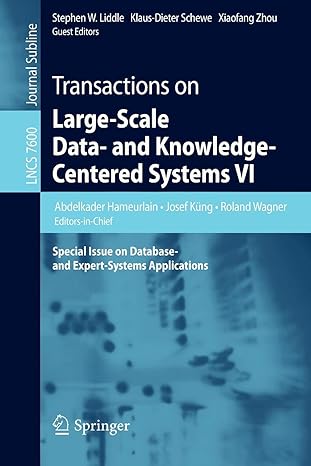Question
The code example FIFO using an array, in Module . FIFO stands for First-In, First Out, meaning the first value read into the FIFO will
The code example FIFO using an array, in Module. FIFO stands for First-In, First Out, meaning the first value read into the FIFO will be the first value read out at some later time. Another queue structure is a LIFO, which is Last-In, First Out. This is also called a stack. When you pop an entry from a LIFO, it will be the most recent value pushed onto the stack.
Based on FIFO.cpp  but using a vector (rather than an array), create a LIFO call your file LIFO.cpp. Make the stored type an int. Because you are using a vector, you do not need to designate the LIFO size as part of the program. In addition, the call to return the absolute size is now meaningless. There is no needfor a Head or a Tail index and therefore no need for an initialization function.
but using a vector (rather than an array), create a LIFO call your file LIFO.cpp. Make the stored type an int. Because you are using a vector, you do not need to designate the LIFO size as part of the program. In addition, the call to return the absolute size is now meaningless. There is no needfor a Head or a Tail index and therefore no need for an initialization function.
What your design needs to do is to enqueue an entry, dequeue an entry, and return the filled size. A function to query whether the LIFO is empty or not is also nice, as is a function to read the last entry without dequeueing it. Retain the return (renamed) values Success and Error, LIFO Empty; you will not need Error LIFO Full. In main(), create the following commands that will verify operation of your LIFO.
d - dequeue next entry from LIFO. Display. e N - enqueue N onto the LIFO er - enqueue a randomly selected number onto the LIFO. Display first. s? - read and display the size of the LIFO e? - is FIFO empty? l? - read (without dequeueing) last entered value q - quit and exit
FIFO.cpp program as below:
#include
#include
#include
#include
#include
using namespace std;
enum { Success, Error_FIFO_Full, Error_FIFO_Empty };
void fifo_initialize(void);
int rtn_fifo_absolute_size(void);
int rtn_fifo_filled_size(void);
bool is_fifo_empty(void);
bool is_fifo_full(void);
char fifo_enqueue(double d_value);
char fifo_dequeue(double& d_value);
int main()
{
double acc;
string command;
// Initialize the FIFO and key the random number generator.
fifo_initialize();
srand(unsigned(time(0)));
cout
cout
"d (Dequeue), "
"e (Enqueue a Number), "
"er (Enqueue a random number), "
"e? (FIFO empty?), "
"f? (FIFO full?), "
"fs? (fill size), "
"as? (absolut size), "
"q (quit) ";
while (true)
{
cout
cin >> command;
// Parse the command
if (command == "d")
{
if (fifo_dequeue(acc) == Success)
{ cout
else
{ cout
}
else if (command == "e")
{
cin >> acc;
if (fifo_enqueue(acc) != Success)
{ cout
}
else if (command == "er")
{
acc = rand() * 1000.0 / RAND_MAX; // Between
0 and 1000
if (fifo_enqueue(acc) != Success)
{ cout
else
{ cout
}
else if (command == "e?")
{
if (is_fifo_empty())
{ cout
else
{ cout
} // end else if - e?
else if (command == "f?")
{
if (is_fifo_full())
{ cout
else
{ cout
} // end else if - f?
else if (command == "fs?")
{ cout
else if (command == "as?")
{ cout
else if (command == "q") break;
else
{ cout
} // end while - infiinite loop
return 0;
} // end main
const int FIFO_SIZE = 10; // Size
double FIFO[FIFO_SIZE]; // FIFO
int head_idx; // Head index
int tail_idx; // Tail index
int filled_size; // Filled size
void fifo_initialize(void)
{
head_idx = tail_idx = filled_size = 0;
return;
} // end fifo_initialize
int rtn_fifo_absolute_size(void)
{
return FIFO_SIZE;
} // end rtn_fifo_absolute_size
int rtn_fifo_filled_size(void)
{
return filled_size;
} // end rtn_fifo_filled_size
bool is_fifo_empty(void)
{
return (filled_size
} // end if - is_fifo_empty
bool is_fifo_full(void)
{
return (filled_size >= FIFO_SIZE) ? true : false;
} // end if - is_fifo_full
char fifo_enqueue(double value_in)
{
char rtn_value = Success;
if (filled_size >= FIFO_SIZE)
{
rtn_value = Error_FIFO_Full;
}
else
{
FIFO[head_idx] = value_in;
if (++head_idx >= FIFO_SIZE)
{
head_idx = 0;
}
filled_size++;
}
return rtn_value;
} // end fifo_enqueue
char fifo_dequeue(double &value_out)
{
char rtn_value = Success;
if (filled_size
{
rtn_value = Error_FIFO_Empty;
}
else
{
value_out = FIFO[tail_idx];
if (++tail_idx >= FIFO_SIZE)
{
tail_idx = 0;
}
filled_size--;
}
return rtn_value;
} // end fifo_dequeue
Step by Step Solution
There are 3 Steps involved in it
Step: 1

Get Instant Access to Expert-Tailored Solutions
See step-by-step solutions with expert insights and AI powered tools for academic success
Step: 2

Step: 3

Ace Your Homework with AI
Get the answers you need in no time with our AI-driven, step-by-step assistance
Get Started


